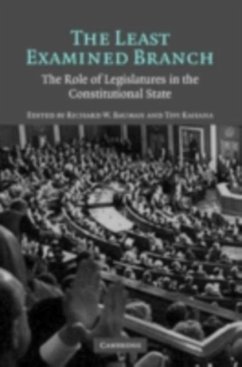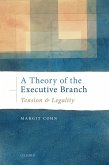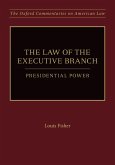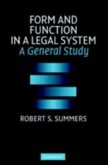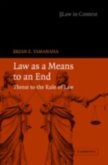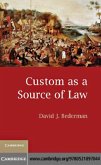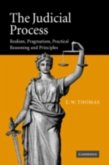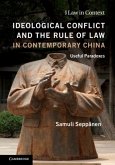Least Examined Branch (eBook, PDF)
The Role of Legislatures in the Constitutional State
Redaktion: Bauman, Richard W.


Alle Infos zum eBook verschenken

Least Examined Branch (eBook, PDF)
The Role of Legislatures in the Constitutional State
Redaktion: Bauman, Richard W.
- Format: PDF
- Merkliste
- Auf die Merkliste
- Bewerten Bewerten
- Teilen
- Produkt teilen
- Produkterinnerung
- Produkterinnerung

Hier können Sie sich einloggen

Bitte loggen Sie sich zunächst in Ihr Kundenkonto ein oder registrieren Sie sich bei bücher.de, um das eBook-Abo tolino select nutzen zu können.
Unlike most works in constitutional theory, which focus on the role of the courts, this book addresses the role of legislatures in a regime of constitutional democracy. Bringing together some of the world's leading constitutional scholars and political scientists, the book addresses legislatures in democratic theory, legislating and deliberating in the constitutional state, constitution-making by legislatures, legislative and popular constitutionalism, and the dialogic role of legislatures, both domestically with other institutions and internationally with other legislatures. The book offers…mehr
- Geräte: PC
- mit Kopierschutz
- eBook Hilfe
- Größe: 4.81MB
- FamilySharing(5)
![A Theory of the Executive Branch (eBook, PDF) A Theory of the Executive Branch (eBook, PDF)]() Margit CohnA Theory of the Executive Branch (eBook, PDF)73,95 €
Margit CohnA Theory of the Executive Branch (eBook, PDF)73,95 €![The Law of the Executive Branch (eBook, PDF) The Law of the Executive Branch (eBook, PDF)]() Louis FisherThe Law of the Executive Branch (eBook, PDF)30,95 €
Louis FisherThe Law of the Executive Branch (eBook, PDF)30,95 €![Form and Function in a Legal System (eBook, PDF) Form and Function in a Legal System (eBook, PDF)]() Robert S. SummersForm and Function in a Legal System (eBook, PDF)40,95 €
Robert S. SummersForm and Function in a Legal System (eBook, PDF)40,95 €![Law as a Means to an End (eBook, PDF) Law as a Means to an End (eBook, PDF)]() Brian Z. TamanahaLaw as a Means to an End (eBook, PDF)34,95 €
Brian Z. TamanahaLaw as a Means to an End (eBook, PDF)34,95 €![Custom as a Source of Law (eBook, PDF) Custom as a Source of Law (eBook, PDF)]() David J. BedermanCustom as a Source of Law (eBook, PDF)29,95 €
David J. BedermanCustom as a Source of Law (eBook, PDF)29,95 €![Judicial Process (eBook, PDF) Judicial Process (eBook, PDF)]() E. W. ThomasJudicial Process (eBook, PDF)40,95 €
E. W. ThomasJudicial Process (eBook, PDF)40,95 €![Ideological Conflict and the Rule of Law in Contemporary China (eBook, PDF) Ideological Conflict and the Rule of Law in Contemporary China (eBook, PDF)]() Samuli SeppanenIdeological Conflict and the Rule of Law in Contemporary China (eBook, PDF)27,95 €
Samuli SeppanenIdeological Conflict and the Rule of Law in Contemporary China (eBook, PDF)27,95 €-
-
-
Dieser Download kann aus rechtlichen Gründen nur mit Rechnungsadresse in A, B, BG, CY, CZ, D, DK, EW, E, FIN, F, GR, HR, H, IRL, I, LT, L, LR, M, NL, PL, P, R, S, SLO, SK ausgeliefert werden.
- Produktdetails
- Verlag: Cambridge University Press
- Erscheinungstermin: 31. Juli 2006
- Englisch
- ISBN-13: 9780511247873
- Artikelnr.: 38194863
- Verlag: Cambridge University Press
- Erscheinungstermin: 31. Juli 2006
- Englisch
- ISBN-13: 9780511247873
- Artikelnr.: 38194863
- Herstellerkennzeichnung Die Herstellerinformationen sind derzeit nicht verfügbar.
Tsvi Kahana is an assistant Professor of Law at Queen's University, Ontario, Canada. He has taught courses at the University of Alberta, the University of Toronto, and Tel-Aviv University. His work has been published at The University of Toronto Law Journal, The Journal of Canadian Public Administration, Queen's Law Journal, and The Supreme Court Law Review.
I. Legislatures and Democratic Theory: 1. Principles of legislation Jeremy
Waldron; 2. An exact epitome of the people Russell Hardin; 3. Political
accountability, proxy accountability, and the democratic legitamacy of
legislatures Jane S. Schacter; 4. Constitutionalism, trade legislation, and
'democracy' Chantal Thomas; Part II. Legislating and Deliberating in the
Democratic Legislature: 5. Legislative judgment and the enlarged mentality:
taking religious perspectives Jennifer Nedelsky; 6. Should we value
legislative integrity? Andrei Marmor; 7. Nondelegation principles Cass
Sunstein; 8. Populism, the legislative process and the Canadian
constitution; Part III. Constitution-making by Legislatures: The Explicit
Version: 9. Legislatures as constitutent assemblies Jon Elster; 10.
Legislatures and the phases and components of constitutionalism Ruth
Gavison; 11. Legislatures and constitutional agnosticism Patricia Hughes;
12. Constitutional amendments and the constitutional common law Adrian
Vermeule; Part IV. Constitution-Making by Legislatures: The Implicit
Version: 13. What do constitutions do that statutes don't (legally
speaking)? Frank I. Michelman; 14. Conditions for framework legislation
Elizabeth Garrett; 15. Super-statutes: the new American constitutionalism
William N. Eskridge, Jr. and John Ferejohn; Part V. Constitutional
Interpretation and Application by the Legislature: 16. Interpretation in
legislatures and courts: incentives and institutional design Mark Tushnet;
17. Constitutional engagement 'outside the courts' (and 'inside the
legislature'): reflections on professional expertise and the ability to
engage in constitutional interpretation Sanford Levinson; 18. Legislation
as constitutional interpretation: another dialogue Andrée Lajoie with
Cécile Bergada and Éric Gélineau; 19. The constitution and congressional
committees: 1971¿2000 Keith E. Whittington, Neal Devins and Hutch Hicken;
Part VI. Is Legislative Constitutionalism Possible?: 20. Democratic
decision-making as the first principle of contemporary constitutionalism
Jeremy Webber; 21. Legislative constitutionalism in a system of judicial
supremacy Daniel A. Farber; 22. Between supremacy and exclusivity Owen
Fiss; 23. Legislatures as rule-followers Frederick Schauer; 24. Popular
revolution or popular constitutionalism? Reflections on the constitutional
politics of Quebec Secession Sujit Choudhry; Part VII. The Legislatures in
Dialogue: Domestic and International Contexts: 25. Disobeying parliament?
Privative clauses and the rule of law David Dyzenhaus; 26. Look who's
talking now: dialogue theory and the return to democracy Andrew Petter; 27.
An international community of legislatures? Daphne Barak-Erez; 28.
Legislatures in dialogue with one another: dissent, decisions, and the
global polity Heather K. Gerken.
I. Legislatures and Democratic Theory: 1. Principles of legislation Jeremy
Waldron; 2. An exact epitome of the people Russell Hardin; 3. Political
accountability, proxy accountability, and the democratic legitamacy of
legislatures Jane S. Schacter; 4. Constitutionalism, trade legislation, and
'democracy' Chantal Thomas; Part II. Legislating and Deliberating in the
Democratic Legislature: 5. Legislative judgment and the enlarged mentality:
taking religious perspectives Jennifer Nedelsky; 6. Should we value
legislative integrity? Andrei Marmor; 7. Nondelegation principles Cass
Sunstein; 8. Populism, the legislative process and the Canadian
constitution; Part III. Constitution-making by Legislatures: The Explicit
Version: 9. Legislatures as constitutent assemblies Jon Elster; 10.
Legislatures and the phases and components of constitutionalism Ruth
Gavison; 11. Legislatures and constitutional agnosticism Patricia Hughes;
12. Constitutional amendments and the constitutional common law Adrian
Vermeule; Part IV. Constitution-Making by Legislatures: The Implicit
Version: 13. What do constitutions do that statutes don't (legally
speaking)? Frank I. Michelman; 14. Conditions for framework legislation
Elizabeth Garrett; 15. Super-statutes: the new American constitutionalism
William N. Eskridge, Jr. and John Ferejohn; Part V. Constitutional
Interpretation and Application by the Legislature: 16. Interpretation in
legislatures and courts: incentives and institutional design Mark Tushnet;
17. Constitutional engagement 'outside the courts' (and 'inside the
legislature'): reflections on professional expertise and the ability to
engage in constitutional interpretation Sanford Levinson; 18. Legislation
as constitutional interpretation: another dialogue Andrée Lajoie with
Cécile Bergada and Éric Gélineau; 19. The constitution and congressional
committees: 1971¿2000 Keith E. Whittington, Neal Devins and Hutch Hicken;
Part VI. Is Legislative Constitutionalism Possible?: 20. Democratic
decision-making as the first principle of contemporary constitutionalism
Jeremy Webber; 21. Legislative constitutionalism in a system of judicial
supremacy Daniel A. Farber; 22. Between supremacy and exclusivity Owen
Fiss; 23. Legislatures as rule-followers Frederick Schauer; 24. Popular
revolution or popular constitutionalism? Reflections on the constitutional
politics of Quebec Secession Sujit Choudhry; Part VII. The Legislatures in
Dialogue: Domestic and International Contexts: 25. Disobeying parliament?
Privative clauses and the rule of law David Dyzenhaus; 26. Look who's
talking now: dialogue theory and the return to democracy Andrew Petter; 27.
An international community of legislatures? Daphne Barak-Erez; 28.
Legislatures in dialogue with one another: dissent, decisions, and the
global polity Heather K. Gerken.
